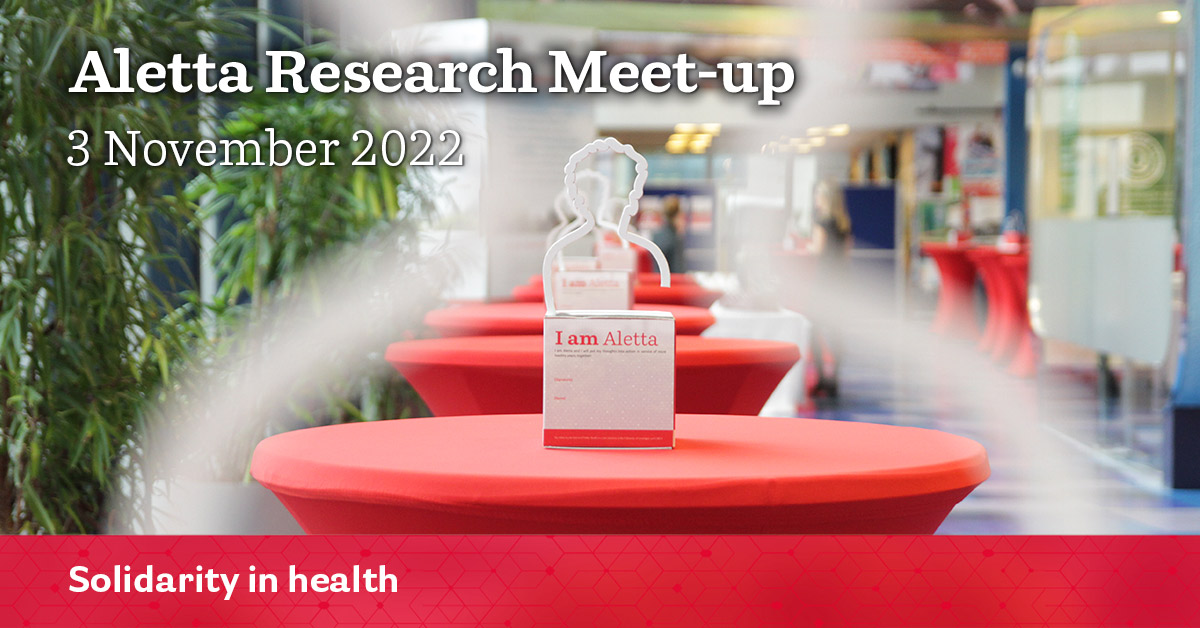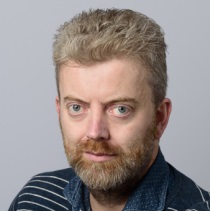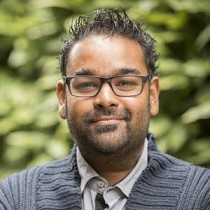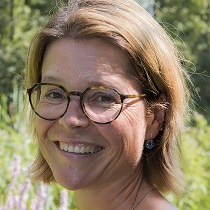Aletta Research Meet-up 3 November 2022
| When: | Th 03-11-2022 09:00 - 17:00 |
| Where: | Academy Building, University of Groningen |

During the Covid-19 pandemic, we have seen the importance of solidarity in healthcare and beyond. Yet, the term has also become rather meaningless as the healthcare sector experienced frustration about the lack of ‘solidarity’, and unrest threatened to dissolve connections between family, friends, neighbours and more.
Many researchers say that solidarity is not their field of study. Yet, this underlying concept is relevant across many disciplines realting to health and needs to be addressed. On 3 November 2022, we will, therefore, meet-up to explore what solidarity in health means, how it is related to health inequality, affordable healthcare, and the increasing problem of loneliness, and how we can make solidarity work in a global health context.
Wish to join us? Register for this live event and join us on the day!
The Aletta Research Meet-up is a place where the connection is sought between science, policy and practice and a meeting place is created for the partners of the School. It is meant for everyone who is interested in public health research in academia, practice, and in between.
The day is hosted by Ruth Koops van 't Jagt.
Programme
|
9:00
|
Welcome coffee
(Bruinszaal)
|
||
|---|---|---|---|
|
9:30
|
Keynote speaker -
Frank Hindriks
(Heymanszaal)
Title: 'Solidarity in health'
|
||
|
10:10
|
Online keynote speaker- Amrish Baidjoe (
Heymanszaal)
Title: 'Solidarity in Global Health, promises vs practice: a medical humanitarian perspective''
|
||
|
10:40
|
Coffee Break (Bruinszaal)
|
||
|
11:10
|
BREAK-OUT SESSIONS
|
||
|
Session 1: Global Health Perspective: Solidarity in crisis
(Room A2)
Chair: Kostiantyn Gorobets |
Session 2: Solidarity in Health: diving deeper into the concept
(Room A3)
|
||
|
12:30
|
Lunch (Bruinszaal)
|
||
|
13:30
|
Keynote speaker -
Brenda Frederiks
(Heymanszaal)
|
||
|
14:00
|
Panel discussion: Solidarity with the old age
(Heymanszaal)
Brenda Frederiks - Assistant professor of health law, Amsterdam UMC Elleke Landeweer - Senior Researcher at UNO-UMCG Jodi Sturge - Postdoctoral reseacher (UNO-UMCG), research associate at Adema Architecten Valentina Gallo - Rosalind Franklin Fellow, associate professor in epidemiology & sustainable health, Campus Friesland, UG Robert Vonk - Senior advisor, Council for Public Health and Society |
||
|
14:45
|
Coffee Break (Bruinszaal)
|
||
|
15:10
|
BREAK-OUT SESSIONS
|
||
|
Session 1: Solidarity with the young generation: sustainable health
(Room A2)
Chair: Marjon de Vos |
Session 2: Solidarity and diversity in health
(Room A3)
Chair: Brenda Mathijssen |
Session 3: Solidarity, poverty, and health
(Room A7)
Chair: Wim Elving |
|
|
16:30
|
Drinks with a summary session (Bruinszaal)
|
||
Keynote speakers

Frank Hindriks
Title: Solidarity in Health
Solidarity is increasingly presented as a solution to problems in public health. But what is solidarity? And how can it help? When solidarity is high, the bonds among people are strong. They perceive themselves as members of a social group (a “we” or an “us”). And they will be ready to help other members of their group. This suggests that solidarity can indeed be an engine of, for instance, informal care. However, there is something paradoxical about invoking solidarity as a solution in contemporary Dutch society. Core features of our society are Individualism, substantial Inequalities, and an increasing emphasis on Individual responsibility. These factors – the three I’s – erode solidarity - our sense of We. So, it seems that solidarity is encouraged during a period in which it is also discouraged. In light of this, I argue that the “rhetoric of solidarity” in public health is deeply problematic.
Bio: Frank Hindriks is professor of Ethics, Social and Political Philosophy at the Faculty of Philosophy at the University of Groningen. He is a member of the Royal Holland Society of Sciences and Humanities, a fellow of Sustainable Cooperation and a board member of the center for Philosophy, Politics and Economics. His research focuses on collective responsibility for sustainable institutions in liberal democracies.

Amrish Baidjoe
Title: 'Solidarity in Global Health, promises vs practice: a medical humanitarian perspective''
The COVID-19 pandemic has shown us once again, without any resolve how disparities exist in health care. Not just between regions and countries but also within countries. Access to healthcare, medical equipment as well as pharmaceuticals has been challenging for many populations across the globe. Infectious diseases have shown us how cross border treats require solidarity across many dimensions. A concept that is not new, but how can we better practice is, especially in places where access to health care remains a big issue. Global prospects in health do look grim with the stacking of crisis, how can we practice solidarity in times where it much needed. What can we do as an international global health address such issues and is the time for silent diplomacy over? In this short talk Amrish will reflect on the observation related to inequity in the humanitarian medical space and operational research and showcase some examples how MSF is humbly trying to address these.
Bio: Amrish Baidjoe is specialised in humanitarian health emergencies and tries to bridge needs between operational humanitarian organisations active in the field and academia. He is a field-epidemiologist and microbiologist (EPIET/EUPHEM) who is currently working with MSF(OCB) as the Director of the Operational Research Centre LuxOR. He holds a position as honorary Assistant Professor at the London School of Hygiene and Tropical Medicine in the department of infectious disease epidemiology. He is also the current elected president of the European Alumni Network for Field-Epidemiology (EAN).

Brenda Frederiks
Title: Solidarity and the elderly
Brenda will focus in her talk on solidarity with older persons, especially those with dementia. She will be discussing the questions: What does the concept of solidarity mean if we talk about care for persons with dementia? How far does their right to health go? And how do we define their right to health? Are they allowed to leave a nursing home, are they allowed to take risks? Or do they need to be locked-up in nursing homes with 24-hour surveillance cameras due to insufficient capacity of caregivers?
Bio: After studying law (major: health law) and health sciences (major: health care policy and management) in Maastricht, Brenda Frederiks obtained her PhD in 2004 with the dissertation: 'The legal position of people with intellectual disabilities: from disability to development. In this thesis the emphasis is on the theme of freedom restriction (legal and empirical research) in the care of people with intellectual disabilities. After her PhD, the legal position of people with (intellectual) disabilities and people with dementia has remained a central theme. Since 2005 she has been working at Amsterdam UMC as an assistant professor and researcher in health law. As a lecturer she teaches (parts of) health law at the faculties of medicine, health sciences and law. As a researcher she has been involved in various studies, with an emphasis on the legal position of vulnerable persons. In addition, she regularly gives lectures and trainings to a very varied audience, such as students of medicine and health sciences, doctors in training, general practitioners in training, and specialists in geriatric medicine in training.


